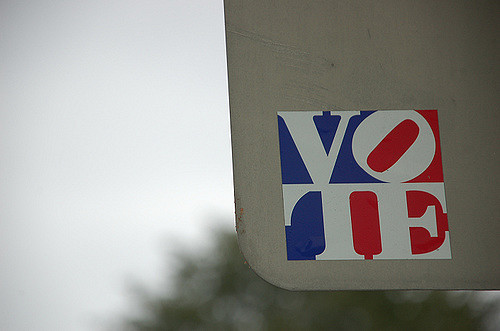As the American political cycle transitions from campaigning to encouraging voting, I am struck by the importance of this election. Contrasted with previous elections, I am struck with how different this election has been, in both content and how it has further polarized American politics. In this regard, this is the most satisfying election that I can think of in the past twenty years. As a new voter, I feel that this election is a great first opportunity to contribute my voice to the electorate. Countless issues of great importance (and worry) have been raised and contributed to. Whether dealing with immigration, international politics, or economic policy, both candidates have raised issues that, now more than ever, effect the younger voters of this generation. It has even been suggested that there is a recent trend of younger voters making their voice heard. This is a critical development for American democracy as a whole.

As a first time voter, the wealth of new information can seem daunting. Learning about the diverse political spectrum not usually reported on by mainstream media and the varied policies and histories surrounding that spectra was, at first, disorienting. Over time, however, I came to realize that such a wealth of information is healthy for American democracy as a whole. With more information available now than ever before, new voters have been given the chance to determine their own political agenda based on their specific ideals and beliefs. Indeed, the power of young voters to sway elected officials and break established norms came to a head this election cycle, with the popularity of the Democratic candidate Bernie Sanders. I for one hope that this trend of addressing popular issues with young voters—issues like costs of living, college tuition, income disparity, and immigration—is a long term trend in the making.
The most common characteristic of young voters is that they don’t vote in the same numbers when compared to any other political group. As a whole, young voters simply do not turn out in the same numbers as older, more experienced voters. As a result of this disparity, candidates often tailor their platforms towards the majority base of their constituents. If a particular candidate polls well with one group of voters, it stands to reason that they will enact policy (if elected), that benefits those constituents. By not voting and not making their voice heard, young voters are isolating themselves from involvement in the political sphere until such a time as their concerns are addressed. This is a bad habit that needs to be broken. If young voters go out, make their voice heard, and most importantly vote, then those candidates that do not address the concerns of these voters will suffer in the polls and election rates.
I have heard young voters called “disenfranchised” by many. Being “disenfranchised” means that a particular voter doesn’t feel the need to vote because they feel their concerns and views will not be addressed. Unfortunately, the play between “disenfranchised” young voters and the lack of economic policy on popular young voter issues (e.g. exorbitant college costs) creates a negative feedback loop. As less young voters go to the polls, less issues relating to young voters are discussed/made into law. This in turn disenfranchises more voters and begins the cycle anew.
Though the situation seems grim, it is one easily addressed. Part of the issue relates to accessibility of voting for younger constituents. That aspect rests in the hands of lawmakers and those voters that make it clear that voting should be more accessible. That process is less simple and could potentially require large numbers of voters. The much easier aspect of solving the issue of “disenfranchised young voters” is simply this:
Go out and vote.
If all the young people in America voted as their elderly counterparts did, the political landscape would be vastly different. By not voting, people take a passive stance on how America progresses as a country. Every voter, be they young or old, has an issue that they feel strongly about. The only difference between the votes of these two groups is the number.
This November, be you Republican, Democrat, Independent, Green Party, I encourage you to go out and make your voice heard in the American political system. Look up voting times, block out dates, and do whatever you can to engage with how your life relates to governance.
With any luck, I’ll see you at the polls.
(photo credit: Ally Aubry/Flickr)

Leave a Reply